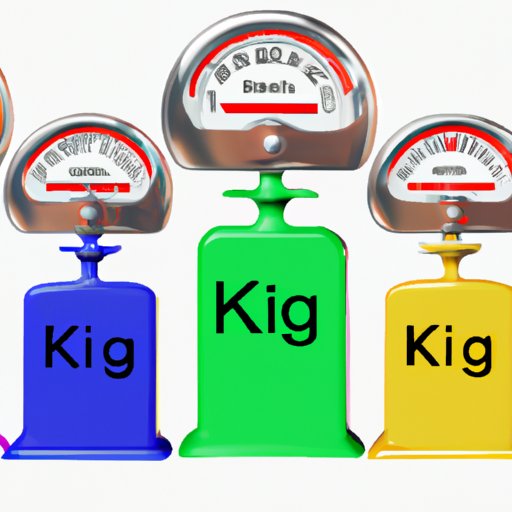I. Introduction
When shopping for groceries or checking our weight, we often encounter both kilograms and pounds. While kilograms are the standard unit of measurement in most countries, pounds still dominate in the US and UK. Knowing how many kilograms are in one pound is essential for accurate measurements, especially in scientific or medical contexts. In this article, we will provide the ultimate guide to understanding kilograms and pounds conversion, including conversion formulas, common mistakes, and real-world examples.
II. “The Ultimate Guide to Understanding Kilograms and Pounds Conversion”
Kilograms and pounds are both units of weight, but they have different origins and current usage. Kilograms are part of the metric system, which originated in France during the late 18th century. The metric system aims to provide a universal and standardized system of measurement, based on multiples of ten. On the other hand, pounds have a more complex historical background, with variations depending on the region and application.
Currently, most countries (including France, Germany, Japan, and Australia) use the metric system and measure weight in kilograms. In the US, UK, and some other countries, pounds still dominate, particularly for everyday usage. In scientific or medical contexts, both units of measurements may coexist, depending on the field or research team.
To convert kilograms to pounds and vice versa, we need to use the following formulas:
1 kilogram = 2.20462 pounds
1 pound = 0.453592 kilograms
These formulas mean that one kilogram is equivalent to 2.20462 pounds, while one pound is equivalent to 0.453592 kilograms. Using these formulas, we can convert any weight in one unit of measurement to the other.
For example, let’s say we want to convert 70 kilograms to pounds. We can use the first formula as follows:
70 kg * 2.20462 = 154.324 pounds
Therefore, 70 kilograms equal roughly 154.324 pounds.
III. “Quick and Easy Conversion: How Many Kilograms Are in One Pound?”
If you need a quick and easy way to convert between kilograms and pounds, you can use the conversion factor 2.20462. This factor allows you to convert kilograms to pounds by multiplying the weight in kilograms by 2.20462. Conversely, to convert pounds to kilograms, you need to divide the weight in pounds by 2.20462.
Here’s a table of common conversions:
| Kilograms | Pounds |
|---|---|
| 1 kg | 2.205 lb |
| 5 kg | 11.023 lb |
| 10 kg | 22.046 lb |
| 50 kg | 110.231 lb |
| 100 kg | 220.462 lb |
IV. “Why Kilograms and Pounds Can Cause Confusion: A Brief Comparison”
Kilograms and pounds can cause confusion due to their different origins, definitions, and usage. For example, while kilograms are based on multiples of ten, pounds are based on a complex historical background. Moreover, kilograms are part of the metric system, while pounds are part of a conventional system that may vary depending on the country or industry.
Another reason why kilograms and pounds can cause confusion is the risk of conversion mistakes. For example, if we confuse the formulas or conversion factors, we may end up with inaccurate measurements. Moreover, some scales or measurements may indicate weight in one unit of measurement when we need the other one.
To avoid common conversion mistakes, we can use conversion calculators, double-check the formulas, and ask for clarification if needed.
V. “Kilograms to Pounds: A Conventional Vs. Metric System Comparison”
Several countries and industries have their own units of weight, which may differ from the metric system and pound system. For example, Japan uses the kan (equivalent to 3.75 kilograms), while India uses the tola (equivalent to 11.664 grams). Moreover, some industries may use specific units of measurement depending on the product or application, such as carats for gems or barrels for oil.
Converting between conventional and metric systems can be challenging, as we need to adjust the conversion factor and account for differences in precision. For example, converting between kilograms and kan requires multiplying or dividing by a factor of 3.75, while converting between kilograms and tola requires dividing by 10 and then multiplying by 11.664.
Here are some examples of different units of measurement used around the world:
| Unit of Measurement | Equivalent to Kilograms |
|---|---|
| Kan (Japan) | 3.75 |
| Tael (Hong Kong) | 0.0375 |
| Tola (India) | 0.011664 |
| Quintal (Brazil) | 50 |
| Attical (Egypt) | 0.0625 |
VI. “A Tale of Two Units: Understanding the Difference Between Kilograms and Pounds”
To understand the difference between kilograms and pounds, we can use analogies and real-world examples. For example, we can imagine kilograms as liters of water, while pounds are equivalent to bricks. While both units measure weight, they have different densities and meanings.
Another way to understand the difference between kilograms and pounds is to use the following formula:
1 pound = 0.453592 kilograms
This formula means that one pound is a fraction of one kilogram, or roughly 0.45 kilograms. Therefore, if we have 10 pounds, we can estimate that we have 4.53 kilograms. Conversely, if we have 50 kilograms, we can estimate that we have 110.231 pounds.
VII. Conclusion
Kilograms and pounds are both important units of measurement for weight, but they have different origins, definitions, and usage. Knowing how many kilograms are in one pound is essential for accurate measurements, especially in scientific or medical contexts. In this article, we provided the ultimate guide to understanding conversion between kilograms and pounds, including conversion formulas, common mistakes, and real-world examples. We also explored differences between the two units of measurements, reasons for their usage, and challenges in converting between conventional and metric systems.
We hope this article has helped you clarify any questions you may have had about kilograms and pounds conversion. Remember to use the formulas, conversion factors, and calculators responsibly, and always double-check your measurements before making any decisions.
